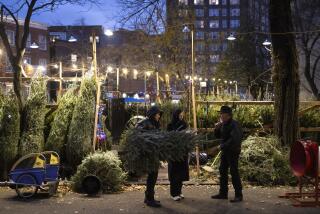Farmer Doesn’t Pine for Mainstream Life
- Share via
When Charles Peltzer was considering a career as an aeronautical engineer, a prospective employer showed him the workplace. It had 200 desks in a single room, each manned by an engineer.
“I was shocked when I looked at the room. I could see myself locked into that kind of career jail with no freedom,” said Peltzer, who was raised on his father’s citrus tree farm in Anaheim, part of which is now Disneyland.
So Peltzer decided agriculture was his calling, although he was unsure of what type of farming he wanted to do.
In 1962, a chance drive past a Christmas tree farm near Yorba Linda settled that dilemma.
“I drove past this farm where a crowd of 100 people were lined up to reserve Christmas trees being grown by that farmer,” recollects Peltzer. “I was astounded.”
It didn’t take long to settle on his future.
“I immediately recognized that Christmas trees were a strong tradition for the whole nation and they were the same as raising citrus trees, except they were seasonal,” he said. That was in 1960.
Today Peltzer has eight leased Peltzer Pines land sites in Orange County where he grows thousands upon thousands of Monterey pine Christmas trees.
“The big joy is still the same,” said Peltzer, referring to the Saturday before Thanksgiving when he starts taking reservations for the Christmas trees that take four years to grow.
This year might be an especially good year.
“When you hear talk of recession you find people tend to stay home, and family and traditional values seem to come out,” he said. “Those are the strongest years for the tree industry.”
He expects to sell 10,000 Christmas trees this year--much of it return business--that range in price from $30 to $50.
While this might be a good year, Peltzer’s other years were just as fulfilling, regardless of sales.
“The actual working of the tree farm is a no-stress, no-deadline business,” he said, “There’s nothing that can’t wait until tomorrow, other than the sales season.”
As a matter of fact “if I want to go fishing, I go and if I want to stay an extra day, I stay,” he said.
And that goes for his six full-time employees who care for and trim the trees that grow from seedlings imported from New Zealand. “There is no supervisor, and they create their own hours and work schedule,” he said.
Peltzer said close friends comment that “I don’t know if you make any money or not but you have a great business lifestyle.”
There is an added benefit working with trees.
“We are really in a rural environment completely disconnected from traffic. And some of the tree sites have a lot of wildlife,” he said.
It took a hefty amount of self-sacrifice during the beginning.
“We barely survived in the beginning,” said Peltzer, who is the father of four sons. “We had no luxuries. It was very scary.”
It was what farming was all about, he told his wife.
“We’re farmers. Maybe in four years we’ll be able to do some of the things our friends are doing,” he said. “You have to sacrifice.”
But in three years they cut 100 trees out of the crop of 2,000 and set up a card table with handmade signs.
“Within a short time every one was sold. I knew it would work well,” he said.
More to Read
Sign up for Essential California
The most important California stories and recommendations in your inbox every morning.
You may occasionally receive promotional content from the Los Angeles Times.













